Unit 1 How do you study for a test教案
九年级英语下册《Unit1Howdoyoustudyforatest.(通用)》教案
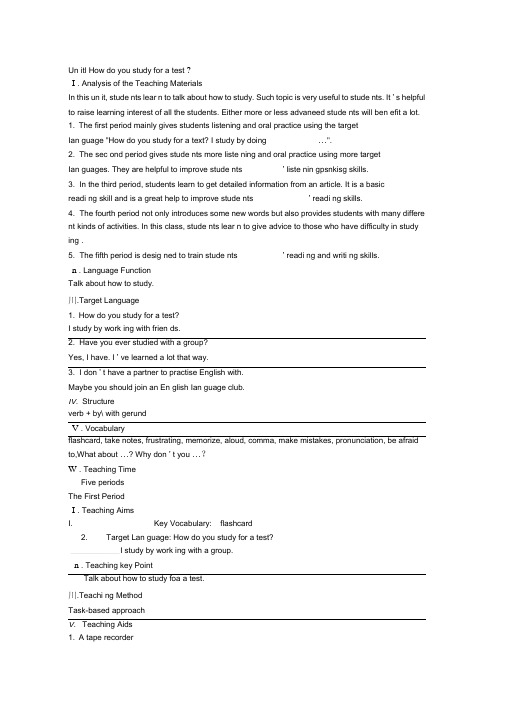
Un itl How do you study for a test ?I . Analysis of the Teaching MaterialsIn this un it, stude nts lear n to talk about how to study. Such topic is very useful to stude nts. It ' s helpful to raise learning interest of all the students. Either more or less advaneed stude nts will ben efit a lot.1. The first period mainly gives students listening and oral practice using the targetIan guage "How do you study for a text? I study by doing …".2. The sec ond period gives stude nts more liste ning and oral practice using more targetIan guages. They are helpful to improve stude nts ' liste nin gpsnkisg skills.3. In the third period, students learn to get detailed information from an article. It is a basicreadi ng skill and is a great help to improve stude nts ' readi ng skills.4. The fourth period not only introduces some new words but also provides students with many differe nt kinds of activities. In this class, stude nts lear n to give advice to those who have difficulty in study ing .5. The fifth period is desig ned to train stude nts ' readi ng and writi ng skills.n . Language FunctionTalk about how to study.川.Target Language1. How do you study for a test?I study by work ing with frien ds.2. Have you ever studied with a group?Yes, I have. I ' ve learned a lot that way.3. I don ' t have a partner to practise English with.Maybe you should join an En glish Ian guage club.IV. Structureverb + by\ with gerundV . Vocabularyflashcard, take notes, frustrating, memorize, aloud, comma, make mistakes, pronunciation, be afraid to,What about …? Why don ' t you …?W . Teaching TimeFive periodsThe First PeriodI . Teaching AimsI. Key Vocabulary: flashcard2. Target Lan guage: How do you study for a test?___________ I study by work ing with a group.n . Teaching key PointTalk about how to study foa a test.川.Teachi ng MethodTask-based approachV. Teaching Aids1. A tape recorder2. Real objectsV . Teaching ProceduresStep I GreetingsT: Did you have a good time during the summer holidays?Where did you go? What did you do?Ask some stude nts to describe their summer holidays.Step n Lead-inT: Is today a special day?(Lead the students to answer: It ' s the first day of the new term)T: What are your new term ' s resolutions?s ask them (Lead the students to answer: I ' m going to get good grades.)T: Last term,Wa ng L inyuan and Zhao Ting got good grades in En glish; let how to study En glish well.T: Wang Linyuan, how do you study for an En glish test?(With the short con versati ons betwee n the teacher and the stude nts,the teacher lead in thenew text----how to study for a text.) Step 川Teach 1aT: How do you study for a test? (Write on the blackboard)S: I study for a test read the textbook.Teacher correct the an swer: Oh, you study by readi ng the textbook.(Let stude nts give differe nt an swers,a nd emphasize verb+by\with gerun d.)1. Show some real thin gs, like flashcards,tapes, the textbook and vocabulary lists,to in troduce theways in 1a.2. Ask the stude nts to tell other ways of lear ning En glish.Sample an swersa. by joining a study groupb. by practis ing con versati ons with my friendsc. by read ing aloud every morningd. by watch ing En glish-la nguage TVNote:A flashcard is a piece of paper or card which students write a word on and use it to memorize in formati on.Step IV 1bThis activity provides stude nts practice in un dersta nding the target Ian guage in spoke n con versati on.1. Let the stude nts look at the pictures in 1b,ask them to tell the ways of lear ning:by making flashcards, by liste ning to tapes,by ask ing the teacher for help2. liste n to the tape, let stude nts write the correct letters.(Comb ine the liste ning task and speak ing task.)T: You will hear one con versati on. You are asked to write the letter of each picture in front of the n ameof the pers on who studies that way.Point out the sample an swer to the class.T: Mei says, "I study by making flashcards. "so the an swer to nu mber 1 is a.Play the recording for the first time.Students only listen. Play the recording a second time. Students write down their answers.Check the an swers with the whole class.An swers1. a2. c3. bStep V 1cThis activity gives stude nts oral practice using the target Ian guage.Read the in struct ions to the class.1. In vite a pair of stude nts to read the con versati on to the class,S1: How do you study for a test?S2: I study by work ing with a group.2. Write the con versati on on the blackboard. The n dem on strate a new con versati on withano ther stude nt.T: How do you study for a test?S3: I study by making flashcards.3. Stude nts work in pairs ,and excha nge the ways of study ing.As stude nts work, teacher walks around and helps with pronun ciati on as n eeded.4. Ask pairs of stude nts to come to the front of the classroom and act out their con versati ons.'ve Step W SummaryT: In this c lass, we ' ve learned some key vocabulary words, such as flashcard. And we also lear nedthe target Ian guages How do you study for a test? I study by work ing with a group.Step Vfl HomeworkAsk stude nts to in terview stude nts in other classes, family members, and friends to try to discoversome new ways of studying that haven ' t been introduced in the book or in class.Step 忸Blackboard DesignUn it 1 How do you study for a test?Section AThe First Period1. Target la nguagesA: How do you study for a test?B: I study by work ing with a group.2. Ways of study ing:by work ing with Frie ndsby making flashcardsby read ing the textbookby maki ng vocabulary listsby liste ning to tapesby ask ing the teacher for help。
Unit1_How_do_you_study_for_a_test教案人教新目标九年级上
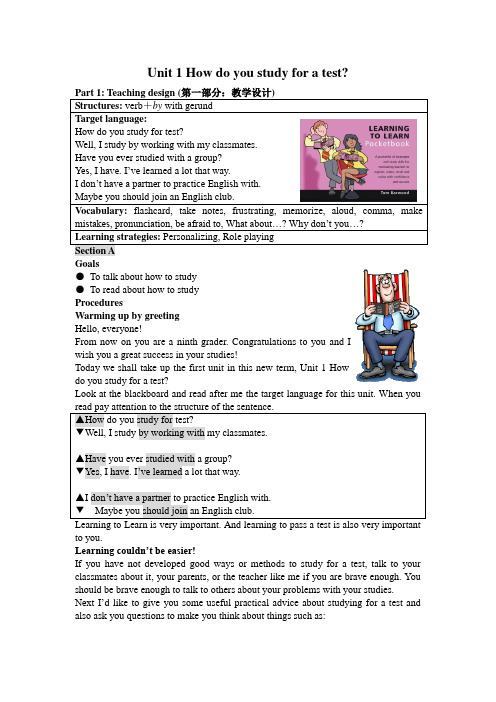
Unit 1 How do you study for a test?Part 1: Teaching design (第一部分:教学设计)Structures: verb+by with gerundTarget language:How do you study for test?Well, I study by working with my classmates.Have you ever studied with a group?Yes, I have. I’ve learned a lot that way.I don’t have a partner to practice English with.Maybe you should join an English club.Vocabulary: flashcard, take notes, frustrating, memorize, aloud, comma, make mistakes, pronunciation, be afraid to, What about…? Why don’t you…?Learning strategies: Personalizing, Role playingSection AGoals●To talk about how to study●To read about how to studyProceduresWarming up by greetingHello, everyone!From now on you are a ninth grader. Congratulations to you and Iwish you a great success in your studies!Today we shall take up the first unit in this new term, Unit 1 Howdo you study for a test?Look at the blackboard and read after me the target language for this unit. When you read pay attention to the structure of the sentence.▲How do you study for test?▼Well, I study by working with my classmates.▲Have you ever studied with a group?▼Yes, I have. I’ve learned a lot that way.▲I don’t have a partner to practice English with.▼Maybe you should join an English club.Learning to Learn is very important. And learning to pass a test is also very important to you.Learning couldn’t be easier!If you have not developed good ways or methods to study for a test, talk to your classmates about it, your parents, or the teacher like me if you are brave enough. You should be brave enough to talk to others about your problems with your studies.Next I’d like to give you some useful practical advice about studying for a test and also ask you questions to make you think about things such as:▲motivation▲how to learn your lessons in the ninth grade year▲different modes of teaching you may meet▲how to develop particular skills, such as note-taking in class1A: Checking the ways you studyI study for a test___By reading to the tape; By underlining the expressions; By reading beyondthe text; By doing used exam papers; By going over exercises books; Bycopying down the text; By learning the text by heart; By speaking with classmatesthe added ways on the blackboard.1b Listening and writingListen to understand how these people in the picture on page 2 study for a test. Write letters from the pictures. While listening, pay attention to the structures of the sentences.Section A 1b TapescriptBoy1:Hey, gang. There’s a big test on Tuesday. I really need some help. Can you tell me how you study for a big test?Voices: Sure! Yes. Sure we will.Boy1:You did really well on the last English test, didn’t you,Mei?Girl1: Yeah, I did OK.Boy1: Well, how did you study?Girl1:By making flashcards.Boy1:Maybe I’ll try that. How did you study, Pierre?Boy2: By asking the teacher for help. She was really happy I asked.Boy1:That’s interesting. How do you study, Antonio?Boy3: I like to study by listening to cassettes. But sometimes my mot her thinks I’m listening to music. And then she gets mad.Boy1:Oh, well…A: How do you study for a test?B: I study by working with a group.C: I study by listening to English.D. I study by playing games with my classmates.E. I study by doing actions such as coloring, matching.F. I study by singing English songs.G. I study by writing letters and emails.H. I study by acting out simple dialogues.I. I study by listening to and understanding stories.J. I study by writing simple sentences.K. I study by imitating from the recording.L. I study by speaking out words or phrases.M. I study by doing simple role plays.N. I study by reading and understanding simple stories.O. I study by using daily expressions.P. I study by performing short plays.Q. I study by performing simple rhymes.R. I study by writing sentences for pictures.S. I study by writing out simple poems.T. I study by reading aloud correctly.U. I study by playing text plays.V. I study by working with classmates.W. I study by going over the text before class.X. I study by copying words and expressions.Y. I study by looking and saying.Z. I study by asking others questions.2a Listening and checkingNow let’s go to page 3. Listen to the tape and check the questions you ask.While listening, pay attention to the structures of the sentences.Section A 2a, 2b TapescriptGirl1:Welcome to the English club. Today we’re going to talk about the best ways to learn English. Who has an idea?Boy1: Do you learn English by watching English-language videos?Girl2:No. It’s too hard to understand the voices.Boy1: What about keeping a diary in English? Do you learn English that way?Girl2:I think so. It helps to write English every day.Girl3: Have you ever studied with a group?Girl2:Yes, I have! I’ve learned a lot that way.Girl1: Do you ever practice conversations with a friend?Girl2:Oh, yes. It improves my speaking skills.Boy1: What about reading aloud to practice pronunciation?Girl3: I do that sometimes. I think it helps.Boy2: I do too. And I always look up new words in a dictionary.Girl3:That’s a great idea!2b Listening and matchingListen again and match each question from 2a with an answer in the box on page 3.2c Doing a pairworkNext we are going to make a conversation in pairs using the information from activities 2a and 2b.A: Have you ever studied with a group?B: Yes, I have. I’ve learned a lot that way.A: Have you ever learned English by watching videos?B:Yes, I have. I’ve learned a lot that way.A: Have you ever practiced conversations with friends?B:Yes, I have. I’ve learned a lot that way.A: Have you ever listened to tapes?B:Yes, I have. I’ve learned a lot that way.A: Have you ever read aloud to practice pronunciation?B:Yes, I have. I’ve learned a lot that way.1.Reading to the tapeWe are going to read the article on page 4. First we shall readto the tape together. That is, we start reading aloud as therecorder goes, and we stop reading aloud as the recorderstops. While reading, let’s pay enough attention to the pauses,the pronunciation and the intonation of the native reader.M ake our reading aloud as the same as the reader’s.2.Reading and dividing the article into partsNext we are going to read aloud the article slowly and clearly. We will try to divide it into thought groups.3.Reading and underliningThis week/ we asked students/ at New Star High School/ about the best ways/ to learn more English. Many said/ they learnt/ by using English. Some students had more specific suggestions. Lillian Li, for example, said/ the best way/ to learn new words/ was by reading English magazines. She said that/ memorizing the words of pop songs/ also helped/ a little. When we asked about studying grammar/ she said, “I never study grammar. It's too boring.”Wei Ming feels differently. He's been learning English/ for six years/ and really loves it. He thinks/ studying grammar /is a great way/ to learn a language. He also thinks that/ watching English movies/ isn't a bad way/ because he can watch the actors/ say the words. Sometimes, however, he finds watching movies/ frustrating/ because the people speak too quickly.Lin Chang said that/ joining the English club/ at school/ was thebest way/ to improve her English. Students get lots of practice/ andthey also have fun. She added that/ having conversations/ withfriends/ was not helpful/ at all. "We get excited/ about something/and then/ end up speaking/ in Chinese,” she said.Ways of learning EnglishNot successful OK SuccessfulLillian Li Studyinggrammar memorizing thewords of pop songsreading EnglishmagazinesWei Ming watching movies watching English studying grammarmoviesLiu Chang havingconversations/ withfriends joining the English clubSilence, please! We are going to have a role play in pairs. One of the pair is to be one Zhao: Excuse me, Li Hong. Could you help me with my English?Li: Yes, please. What’s the matter?Zhao: I have difficulty studying grammar.Li: Grammar? I never studying grammar. I study English mostly by memorizing the words of pop songs.Zhao: No grammar at all?Li:Yes, I did study grammar. But I study it by reading English magazines. I put grammar learning into reading articles. That is the best way to understand English grammar.Turn to page 4 to check √what you do to learn English in the box.Closing down by asking and answering—How did you learn English?*I listened to English them every day.**I learned many English songs by heart.*I sang the English songs to myself.*I learned every new English word in the text.*I learn English by going to English classes.*I do English homework at school.*I read English textbooks in the evening.*I speak English very slowly.**I read a lot of English sentences in the morning.*I do well in class English tests.*I get a lot of good advice on learning English from my teacher.*I discuss English problems with my classmates.*I follow the advice from my father.*I learn English sounds from the tape.*I use English-English dictionaries.*I listen to recordings and English-language TV.*I talk to native speakers every chance I got.*I read books in English, mostly novels.*I learn a lot of new words from English books.*I write more and more e-mail in English.*I use English more than my first language.*Most of my reading (websites and books) is in English.Section BGoals●To listen about learning English●To talk about learning English●To read about learning EnglishProceduresWarming up by reading to the recordingHello, everyone. To begin with, let’s listen and read to the recording of the text HOW DO YOU LEARN BEST? That is, read aloud to the tape, as fast as the tape goes, as clearly as the native reader reads. OK? Here we go!My cat speaks English.Sometimes my cat comes to me and tells me that she is hungry. Or that her leg hurts. How does my cat tell me these things? I don't speak pussy-cat language.1a Reading and checkingLearning English can be both easy and difficult. Whatthings are easy for you? And what things are difficult foryou? Now turn to page 5, read the list on the top and check√the statements that are true for you.1b Making a listYou have read and checked the statements true for you.Now think and make a list of other things difficult for you,too.I don’t know how to…!1. I don’t know how to use commas.2. I don’t know how to work with others.3. I don’t know how to make flashcards.4. I don’t know how to read the textbook.5. I don’t know how to make vocabulary lists.6. I don’t know how to listen to tape.7. I don’t know how to ask the teacher for help.8. I don’t know how to study for a test.9. I don’t know how to work with a group.10. I don’t know how to watch English videos.11. I don’t know how to practice conversations with friends.12. I don’t know how to read aloud to practice pronunciation.13. I don’t know how to learn by using English.14. I don’t know how to get more specific sug gestions.15. I don’t know how to read English magazines.16. I don’t know how to learn new words.17. I don’t know how to memorize the words.18. I don’t know how to studying grammar19. I don’t know how to watching English movies20. I don’t know how to joining the English club21. I don’t know how to improve her English22. I don’t know how to get lots of practice13. I don’t know how to ask teachers about the best ways to learn more English.2a Listening and checkingPaul is a nice boy. He works hard at his English, but still has many learning challenges. Now listen to find out what challenges he has and check them in the box on page 5.Challenges to Paul at learning English1._____ can’t get the pronunciation right.2._____ forget a lot of new words.3._____ can’t understand when people talk to me.4._____ can’t understand the words in magazines.5._____ don’t get much writing practices.2b Listening and matchingNow listen again to Paul talking about his challenges at learning English and match them with the solutions listed in the box on page 5. While listening, pay attention to the structures of the sentences.TapescriptTeacher:You look worried, Paul.Boy:I am, Ms Mitchell. I’m having trouble learning English.Teacher:You said you liked English. What’s the problem?Boy:I can’t get the pronunciation right.Teacher:Well, listening can help. Why don’t you borrow theteacher’s tapes? You can listen to them at home and repeatthe sentences that are difficult for you.Boy:That’s a good idea. But what about all the new words? I forget a lot of new words.Teacher:You can always write the new words in your notebook and study them at home. You can even study in the train on the way to school.Boy: That might really help! Thanks.Teacher:Can you understand when people talk to you?Boy:Well, no. Not always. Sometimes I just don’t understand what people are saying. Teacher:Why don’t you join an English language club to practice speaking English?The English club meets after school on Tuesdays and Thursdays.Boy:Maybe I’ll go. The only other problem I have is that I don’t get much writing practice.Teacher:Maybe you should find a pen pal.Boy: That sounds like a fun way to practice writing. Thanks, Ms Mitchell.2c Doing pairworkIN pairs we are going to role play conversations using the information from activities 2a and 2b.I don’t have a partner to practice English with. Maybe you should join an English language club.I can’t get the pronunciation right.Listening can help.I forget a lot of new words. Write the new words on cards and studythem daily.I can’t understand when people talk to me. You can join an English club to talk to people more in English.I can’t understand the words inmagazines.You can look them up in a dictionary.I don’t get much writing practices.Start writing an English diary every day.I read very slowly. You should read to the recording of thetext.I make mistakes in grammar. Why don’t study the basic sentencepatterns3a Reading and cuttingWe are going to read the text again to study the form and function ofall the predicate verbs.How I learned to learn EnglishLast year/ my English class/ was difficult/ for me. First of all, it wasn't easy/ for me/ to understand the teacher/ when she talked to the class. To begin with, she spoke/ too quickly, and I couldn't understand every word. Later on, I realized that/ it doesn't matter/ if you don’t understand/every word. Also/ I was afraid to speak/ in class, because/ I thought/ my classmates/ might laugh at me. I couldn't always make complete sentences, either. Then/ I started to watch English-language TV. It helped/ a lot. I think that/ doing lots of listening practice/ is of the secrets of becoming a good language learner. Another thing/ that I found/ very difficult/ was English grammar. So/ I decided to take lots of grammar notes/ in every class. Then/ I started to write my own original sentences/ using the grammar/(that) I was learning. It’s amazing/ how much/ this helped. Now/ I am enjoying learning English/ and I got an A/ this term. My teacher is very impressed.Now you may read the statements in the box on page 6 following the text. Write “T” or “F” beside each statement.3b Writing a letterDear Lin Feng,I know it isn’t easy to learn English, but I have some ideas that may help. You said you couldn’t understand people who talked fast. Well, you cantry to listen for the most important words, not every word. It isdifficult to understand by listening what you have not read orwhat you can’t understand well by reading. To listen well youhave to read well. So keep on reading English. Listening andreading to the recording of the text is very important, too. Everytext, after being read, should be listened to and read aloud to the tape. At first you may find it difficult to follow the reader reading aloud the text. Don’t worry. If you keep practicing you will be able to read aloud as fast as the native reader from the tape. And then you can understand people who talk fast in English.Yours,Tai Zuo4 Doing an interviewNext we shall do an interview in groups of four. Ask the three group mates about learning English. Take notes of what they say. Tomorrow you shall stand to tell the Q. What isn’t easy about learningEnglish?A. Reading is not easy.Q. What do you do about this? A. I try to cut the sentences into thoughtgroups.Q. What is your favorite way to learn more English? I read and read aloud a lot. These are the best way.Rain, rain, go away,Come again another day,Little JohnnyWants to play.Rain, rain, go to Spain,Never show your face again.SELF CHECK1.Filling in the blankWe shall make a check on our use of expressions first. Turn to page 7 and fill in each blank with the correct word given. Change the form of the word if necessary. ThenComplete the sentences Make your sentences1. You should write down new Englishwords in a vocabulary list.Don’t trust your memory. Write it down.2. If you don’t know how to spell newwords, look them up in a dictionary.I don’t know how to spell your name.3. The best way to improve your Englishis to join an English club.I’d like to join the school football tea.4. Another thing that he find very difficultwas English grammar.I find it easy to learn English.5. This kind of paper feels very soft. Do you feel cold?Turn to page 7 and write an article about Xu Zheng using the notes on Xu and his essay.As English is learned mostly through reading in China, we shall now turn to page 8 to learn to read the article entitled: How do we deal with our problem?Before reading,please go over the vocabulary list for reading on page 146. Get yourself familiarized with all the words and expressions to be found in the article.Tips for BeginnersYou are like a new babyBabies learn their language slowly.First they learn to listen.Then they learn to talk.Finally, they can read and write.Listen to English every dayListen to English radio.Watch English TV.Go to English movies.Use online lessons.Make an English/ESL friendMake up conversations.Practice dialogues.Use beginner textbooks.Read English storiesStart with children's storybooks.Try ESL readers.Read advertisements, signs and labels.Write down new wordsStart a vocabulary (new word) notebook. Write words in alphabetical order (A...B...C...). Make example sentences.Always use an English-English dictionary first. Keep an English diaryStart with one sentence.How do you feel?How is the weather?What did you do today?Write another sentence tomorrow. Visit an English speaking country Learn English more quickly. Stay with an English family. Hear native speakers talk.Have a fun experience.。
新目标人教版九年级unit1教案
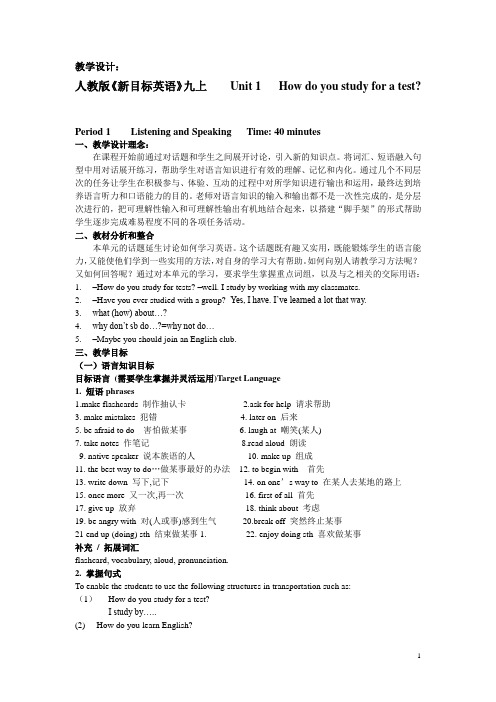
教学设计:人教版《新目标英语》九上Unit 1 How do you study for a test?Period 1 Listening and Speaking Time: 40 minutes一、教学设计理念:在课程开始前通过对话题和学生之间展开讨论,引入新的知识点。
将词汇、短语融入句型中用对话展开练习,帮助学生对语言知识进行有效的理解、记忆和内化。
通过几个不同层次的任务让学生在积极参与、体验、互动的过程中对所学知识进行输出和运用,最终达到培养语言听力和口语能力的目的。
老师对语言知识的输入和输出都不是一次性完成的,是分层次进行的,把可理解性输入和可理解性输出有机地结合起来,以搭建“脚手架”的形式帮助学生逐步完成难易程度不同的各项任务活动。
二、教材分析和整合本单元的话题延生讨论如何学习英语。
这个话题既有趣又实用,既能锻炼学生的语言能力,又能使他们学到一些实用的方法,对自身的学习大有帮助。
如何向别人请教学习方法呢?又如何回答呢?通过对本单元的学习,要求学生掌握重点词组,以及与之相关的交际用语:1. –How do you study for tests? –well. I study by working with my classmates.2. –Have you ever studied with a group?- Yes, I have. I’ve learned a lot that way.3. what (how) about…?4. why don’t sb do…?=why not do…5. –Maybe you should join an English club.三、教学目标(一)语言知识目标目标语言(需要学生掌握并灵活运用)Target Language1. 短语phrases1.make flashcards 制作抽认卡2.ask for help 请求帮助3. make mistakes 犯错4. later on 后来5. be afraid to do 害怕做某事6. laugh at 嘲笑(某人)7. take notes 作笔记8.read aloud 朗读9. native speaker 说本族语的人10. make up 组成11. the best way to do…做某事最好的办法12. to begin with 首先13. write down 写下,记下14. on one’s way to 在某人去某地的路上15. once more 又一次,再一次16. first of all 首先17. give up 放弃18. think about 考虑19. be angry with 对(人或事)感到生气20.break off 突然终止某事21 end up (doing) sth 结束做某事1. 22. enjoy doing sth 喜欢做某事补充/ 拓展词汇flashcard, vocabulary, aloud, pronunciation.2. 掌握句式To enable the students to use the following structures in transportation such as:(1)----How do you study for a test?----I study by…..(2)----How do you learn English?----I learn by….(3)----Do you learn English by…?----Yes, I do / No, I don’t.(4)----Have you ever studied with a group?----Yes, I have. I’ve learned a lot that way.(二)语言技能目标1.学会谈论如何学英语。
《Unit 1 How do you study for a test?》教案(3)(1)
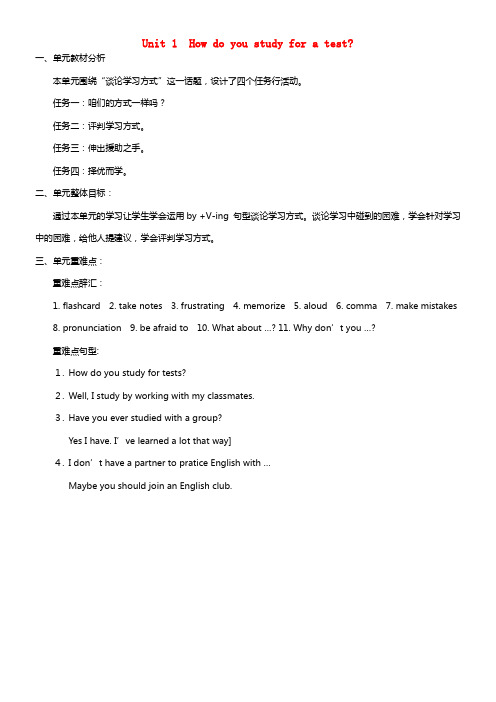
Unit 1 How do you study for a test?一、单元教材分析本单元围绕“谈论学习方式”这一话题,设计了四个任务行活动。
任务一:咱们的方式一样吗?任务二:评判学习方式。
任务三:伸出援助之手。
任务四:择优而学。
二、单元整体目标:通过本单元的学习让学生学会运用by +V-ing 句型谈论学习方式。
谈论学习中碰到的困难,学会针对学习中的困难,给他人提建议,学会评判学习方式。
三、单元重难点:重难点辞汇:1. flashcard2. take notes3. frustrating4. memorize5. aloud6. comma7. make mistakes8. pronunciation 9. be afraid to 10. What about …? 11. Why don’t you …?重难点句型:1.How do you study for tests?2.Well, I study by working with my classmates.3.Have you ever studied with a group?Yes I have. I’ve learned a lot that way]4.I don’t have a partner to pratice English with …Maybe you should join an English club.四、单元教学方式:采纳Concluding, Role playing 和Comparing 的学习策略,来展开课堂pairwork 问大师的口语交际活动和讨论活动来谈论名人所采纳的学习方式。
辞汇教学:情景操练,反复利用。
口语教学;师生互动,生生互动,对话练习,交际活动。
阅读教学:利用词典等工具书,依照上下文查寻词义。
语法教学:总结规律,仿照操练。
五、单元课时分派:本单元用四课时;第一课时―――语法和辞汇第二课时―――听说第三课时―――读写第四课时―――综合训练Unit 1 How do you study English?The first period ( grammar and vocabulary )1.知识目标:重点辞汇:flashcard, take notes, frustrating, memorize, aloud, comma, make mistakes, pronunciation, be afraid to, what about, why don’tyou…?重点句型:How do you study for tests? /Well. I study by working with my classmates.Have you ever studied with a group? /Yes, I have. I’ve learned a lot that way.I don’t have a partner to practice English with. /Maybe youshould join an English club.2.能力目标:⑴学会谈论学习方式⑵学会谈论学习中碰到的困难⑶学会针对学习中的困难,给他人提建议⑷学会评判学习方式二.教学重难点:1.重点:verb + by with gerund2.难点:运用所学知识谈论学习中的困难,并能提出相应建议。
2019-2020年九年级英语Unit1Howdoyoustudyforatest教案人教新目标版
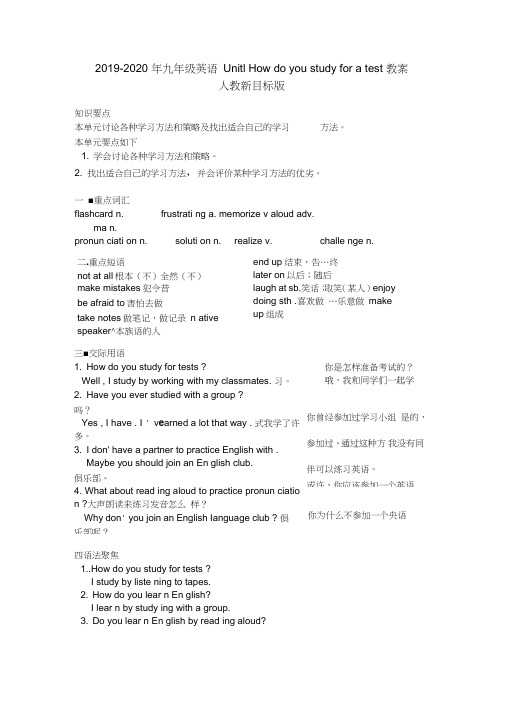
2019-2020 年九年级英语 Unitl How do you study for a test 教案人教新目标版知识要点本单元讨论各种学习方法和策略及找出适合自己的学习 方法。
本单元要点如下1. 学会讨论各种学习方法和策略。
2. 找出适合自己的学习方法,并会评价某种学习方法的优劣。
一 ■重点词汇flashcard n.frustrati ng a. memorize v aloud adv.ma n.pronun ciati on n.soluti on n.realize v.challe nge n.二.重点短语not at all 根本(不)全然(不) make mistakes 犯令昔 be afraid to 害怕去做take notes 做笔记,做记录 n ative speaker ^本族语的人end up 结束,告…终 later on 以后;随后 laugh at sb.笑话;取笑(某人) enjoy doing sth .喜欢做 …乐意做 make up 组成三■交际用语1. How do you study for tests ?Well , I study by working with my classmates. 习。
2. Have you ever studied with a group ?吗?Yes , I have . I ' v e arned a lot that way . 式我学了许多。
3. I don' have a partner to practice English with .Maybe you should join an En glish club.俱乐部。
4. What about read ing aloud to practice pronun ciatio n ?大声朗读来练习发音怎么 样?Why don ' you join an English Ianguage club ? 俱乐部呢?你为什么不参加一个央语 四语法聚焦1..How do you study for tests ?I study by liste ning to tapes. 2. How do you lear n En glish?I lear n by study ing with a group.3. Do you lear n En glish by read ing aloud?你是怎样准备考试的? 哦,我和同学们一起学你曾经参加过学习小组 是的,参加过。
人教版九年级英语Unit 1 How do you study for a test- Section A教案及教学反思
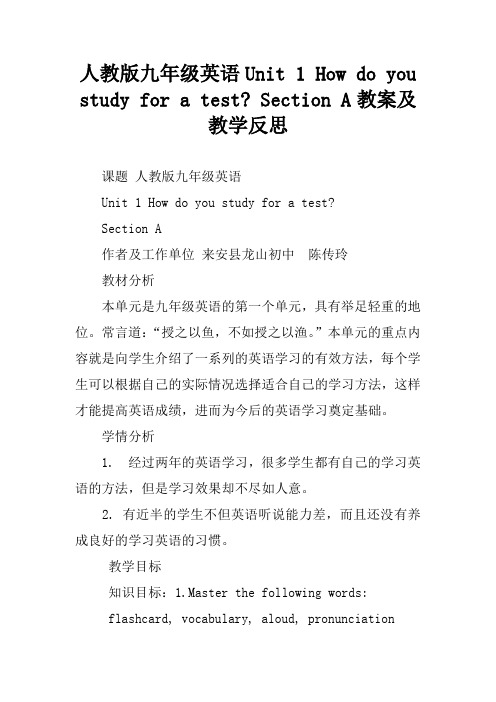
人教版九年级英语Unit 1 How do you study for a test? Section A教案及教学反思课题人教版九年级英语Unit 1 How do you study for a test?Section A作者及工作单位来安县龙山初中陈传玲教材分析本单元是九年级英语的第一个单元,具有举足轻重的地位。
常言道:“授之以鱼,不如授之以渔。
”本单元的重点内容就是向学生介绍了一系列的英语学习的有效方法,每个学生可以根据自己的实际情况选择适合自己的学习方法,这样才能提高英语成绩,进而为今后的英语学习奠定基础。
学情分析1. 经过两年的英语学习,很多学生都有自己的学习英语的方法,但是学习效果却不尽如人意。
2. 有近半的学生不但英语听说能力差,而且还没有养成良好的学习英语的习惯。
教学目标知识目标:1.Master the following words:flashcard, vocabulary, aloud, pronunciation2.Be able to master the ways of learning English技能目标:1.Be able to talk about the ways of learning English with your partners.2.Be able to understand what they listen in class.情感目标:Have a positive attitude towards learning English.教学重点和难点重点:Master the ways of learning English well.难点:1.Be able to talk about the ways of learning English with your partners.2. Have a positive attitude towards learning English.教学过程。
人教版九年级英语全一册教案
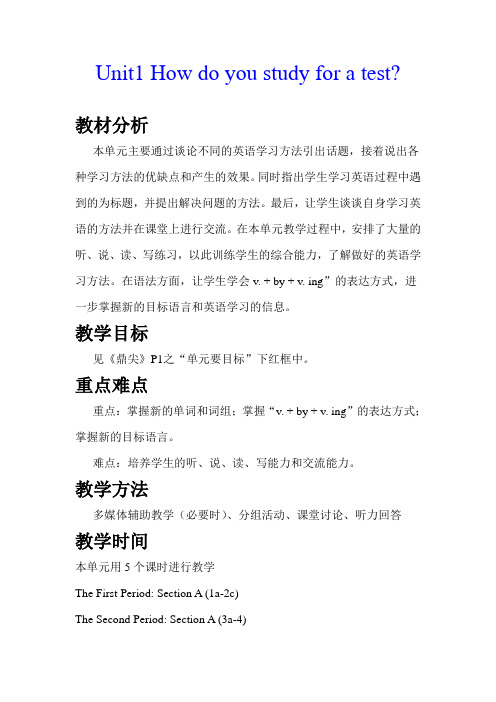
Unit1 How do you study for a test?教材分析本单元主要通过谈论不同的英语学习方法引出话题,接着说出各种学习方法的优缺点和产生的效果。
同时指出学生学习英语过程中遇到的为标题,并提出解决问题的方法。
最后,让学生谈谈自身学习英语的方法并在课堂上进行交流。
在本单元教学过程中,安排了大量的听、说、读、写练习,以此训练学生的综合能力,了解做好的英语学习方法。
在语法方面,让学生学会v. + by + v. ing”的表达方式,进一步掌握新的目标语言和英语学习的信息。
教学目标见《鼎尖》P1之“单元要目标”下红框中。
重点难点重点:掌握新的单词和词组;掌握“v. + by + v. ing”的表达方式;掌握新的目标语言。
难点:培养学生的听、说、读、写能力和交流能力。
教学方法多媒体辅助教学(必要时)、分组活动、课堂讨论、听力回答教学时间本单元用5个课时进行教学The First Period: Section A (1a-2c)The Second Period: Section A (3a-4)The Third Period: Section B (1a-3a, 3c)The Fourth Period: Section B (3b-self check)The Fifth Period: Reading---How do we deal with our problems?语法先导1.介词by 的用法表示通过…方法或途径的意思,译成“靠,通过”,后面可加名词或名词短语。
e.g.(1)The house was destroyed by fire. 房屋被火烧毁了。
(2)travel by air /land/sea. 航空(陆路,航海)旅行(3)go by train /boat/ bus 乘火车(船,公共汽车)去(4)shake sb. by the hand 和某人握手(5)I study English by watching English movies. 我通过看英文电影学英语。
原创九年级unit1 How do you study for a test?教学案例
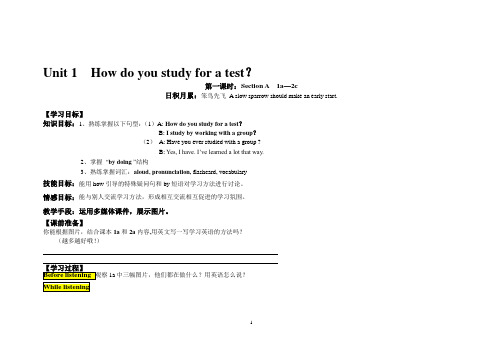
Unit 1 How do you study for a test?第一课时:Section A 1a—2c日积月累:笨鸟先飞A slow sparrow should make an early start.【学习目标】知识目标:1、熟练掌握以下句型:(1)A: How do you study for a test?B: I study by working with a group?(2)A: Have you ever studied with a group ?B: Yes, I have. I’ve learned a lot that way.2、掌握“by doing”结构3、熟练掌握词汇:aloud, pronunciation, flashcard, vocabulary技能目标:能用how引导的特殊疑问句和by短语对学习方法进行讨论。
情感目标:能与别人交流学习方法,形成相互交流相互促进的学习氛围。
教学手段:运用多媒体课件,展示图片。
【课前准备】你能根据图片,结合课本1a和2a内容,用英文写一写学习英语的方法吗?(越多越好哦!)【学习过程】Before listening 观察1a中三幅图片,他们都在做什么?用英语怎么说?While listening1、听1b中孩子们谈论的学习英语的方法。
根据所听录音,将1b中的人名与1a图片中的字母匹配。
2、2、听两遍录音,完成下面的对话。
A: You did really well on the last English test, didn’t you, Mei?C: Yeah, I did OK.A: well, how did you study?C: By making .A: Maybe I’ll try tha t. How did you study, Pierre?D: By the teacher . She was really happy I asked.A: That’s interesting., Antonio?E: I like to study by tapes . But sometimes my mother thinks I’m listening to music. And then she gets mad. 观察与思考: 1.仿照1c对话,两人一组,试着练习下面的句型,A: How do you study …? B :I study by …?4、熟读2a的五个问题。
- 1、下载文档前请自行甄别文档内容的完整性,平台不提供额外的编辑、内容补充、找答案等附加服务。
- 2、"仅部分预览"的文档,不可在线预览部分如存在完整性等问题,可反馈申请退款(可完整预览的文档不适用该条件!)。
- 3、如文档侵犯您的权益,请联系客服反馈,我们会尽快为您处理(人工客服工作时间:9:00-18:30)。
Unit 1 How do you study for a test ?Teaching goals:语言知识目标:1.学会用by短语表达学习方法。
2.V ocabulary: flashcard , take notes ,frustrating ,memorize ,aloud ,comma ,make mistakes ,pronunciation ,be afraid of ,Why don’t you … ?3.Pattern: How do you study for a test ?Well .I study by working with my classmates .Have you ever studied with a group ?Yes , I have .I’ve learned a lot that way .语言技能:学生能与同学们交流和讨论学习方法。
学习策略:使学生能根据自己的实际采用适当的学习方法,并形成个性化的学习。
文化意识:了解英美国家学生学习的主要方法。
情感态度:形成相互交流相互促进的学习氛围。
Important and difficult points :1.Functions: Talk about how to study .2.Structures: Verb + by with gerund .Teaching aids: tape and tape recorder, some flashcards .Period 1Teaching contents :SectionA 1a, 1b, 1c, 2a, 2b, 2c.Teaching procedures:Step 1 Leading in1.Greetings .2.Ask some students about their summer holidayStep 2 Pre-taskSB Page 2, 1a .1.Ask several students to tell you how they study for a test .Write their answers onthe blackboard .2.Call some volunteers to read the phrases on Page 2 .Explain something about thestructures “verb + by with gerund ”.3.Read the phrases ,students repeat .Step 3 While-taskSB Page 2, 1b .Read the instructions to the students and make sure students know what to do .Then play recording and check the answers .SB Page 2 , 1c .1.First students work in pairs to talk about the picture .2.Then ask several pairs to present their dialogues .SB Page 3 , 2a & 2b .1.Read the instructions to students and ask some volunteers to read after you ifnecessary .2.Play the recording ,students finish the work .Check the answers .3.Ask some students to read the questions and answers in pairs .Step 4 Post-task1.In pairs ,students talk about how to study for several minutes .2.Ask some students how they study individually .3.SB Page 3 , 2c .Get students work in pairs .Ask a few pairs to present theirconversations .Step 5 Grammar FocusRead the questions and answers in the grammar box .Students repeat .Explain something about them if it is necessary .Step 6 Homework1. I study English (看英语杂志).2. I study English (记流行歌曲歌词).3. I study English (加入英语俱乐部).4. you , learn , by , do , English , aloud , reading5. can’t , new , words , lots of , I , memorize .教学后记:Period 2Teaching contents: Section A 3a , 3b , 4 , Section B 1a , 1b , 1c , 2a , 2b ,2c . Teaching procedures :Step 1 RevisionAsk some students how they study English ,get them to answer individually .Step 2 ReadingSB Page 4 , 3a .1.First ,ask one volunteer to read the article aloud to the class .2.Have students read through the passage one or two times and complete the charton their own .3.Correct the answers .Step 3 PairworkSB Page 4 , 3b .1.Read the instructions to the class and ask a pair of students to practice the sampleconversation .2.Then in pairs ,have students make their own conversation according to activity3a .3.Ask some pairs to present their conversations .SB Page 4 , Part 4 .1.Ask students to check what they do to learn English in the chart .Then get them towork in pairs to interview their partner .2.Call some pairs to act out their dialogues in front of the class .Step 4 PracticeSB Page 5 , 1a & 1b .1.Ask one student to read the sentences to the class .2.Then have students check the statements which are true for them and ask them toadd some other different things .3.Ask several students to write their lists on the blackboard and discuss them withthe whole class .Step 5 ListeningSB Page 5 , 2a & 2b .1.Ask two students to read the challenges and solutions .If necessary ,have studentsrepeat after you .2.Play the recording two or three times ,let students listen and finish the work .3.Ask one student to have his/her answers with the class .4.Correct the answers .Step 6 PairworkSB Page 5 , 2c .In pairs ,students role play conversations using the information from activity 2a and 2b .Then ask some pairs to present their dialogue to the class .Step 7 HomeworkWrite an article to introduce how you study English .教学后记:Period 3Teaching contents: Section B 3a, 3b , 3c , 4 , selfcheck .Teaching procedures :Step 1 Revision1.Greetings .2.Check the homework .Step 2 ReadingSB Page 6 , 3a .1.Read the instructions and make sure students know what to do .2.Give students several minutes to read the article and finish the task .3.After students finished ,ask one student to write his/her answers on theblackboard.4.Correct the answers .5.Ask one volunteer to read the article aloud to the class ,offer assistance ifnecessary .Step 3 WritingSB Page 6 , 3b .First ,have students finish the letter on their own ,while they are working ,walk around and give them some help .Then ask two students to read their letter aloud to the class .Finally answer some questions the students may have .Step 4 InterviewSB Page 6 ,Part 4 .1.Read the instructions and explain how to finish this task .2.Divide the class into groups of four. In each group ,each student takes turninterviewing the other students and take notes .3.Ask some groups to tell the class about their answers .Step 5 Self-checkSB Page 7 , Part 1 .1.Students finish it on their own first ,then check the answers with the whole class .2.Ask some students to make their own sentences with these words orally .SB Page 7 , Part 2 .1.First ,read the instructions and explain something in the notes .2.Ask students to write an article .3.Ask someone to read his article to the class .Step 6 HomeworkSB Page 6 , 3c .Have students finish the article as their homework .教学后记:Period 4Teaching contents : Reading: How do you deal with our problems ?Teaching procedures :Step 1 Leading inAsk students to thing of some reading strategies they have learned before, and write down them on the blackboard .Step 2 Pre-taskSB Page 8 , Section 1 .1.Let students think of some problems they have had recently. Then in pairs, telltheir partner how they dealt with them .2.In pairs, get students to look up the words in activity 1b .Step 3 While-taskSB Page 8 , Section 2 .1.Explain something about the learning strategy .2.Let the students scan the passage for main idea .3.Explain some phrases:d eal with try one’s best to do sthb e angry with It’s our duty to do sthcomplain about c ompare … to …c hange … into … think aboutLet’s not worry about our problems,let’s face the challenges instead.4.Let students read the passage again ,this time read carefully .5.Ask some comprehension questions about the passage .Step 4 Post-taskSB Page 9, Section 3 .1. 3a .Students finish it first ,then check the answers with the whole class .2. 3b.Help students to finish the work .3. 3c.First let students do it on their own ,then check the answers .Step 5 HomeworkSB Page 9, Section 4 .1.First discuss it with the whole class ,then get the students to write a short passageabout the ways of dealing with problems .2.Have them write it on their exercise books .教学后记:Additional : some useful expressions in this unitmake mistakes 犯错,出错laugh at 嘲笑,取笑deal with 处理,应付not at all 根本不,一点也不be afraid of 害怕be afraid to 害怕,不敢take notes 做笔记,做记录be angry with 对…感到生气t ry one’s best to do sth尽力做… Why don’t … ?为什么不… worry about 担心complain about 抱怨,投诉change into 把…变成c ompare … to/with …把…与…相比。
